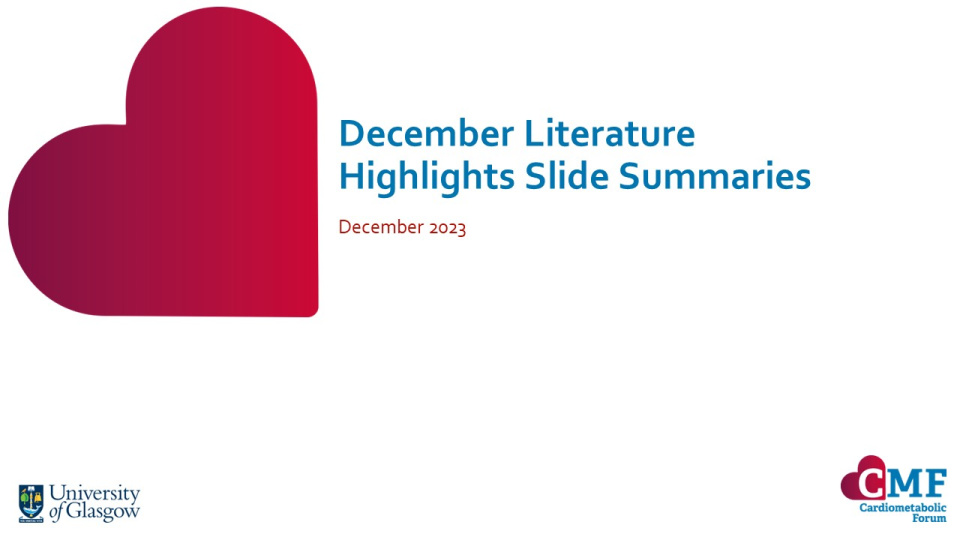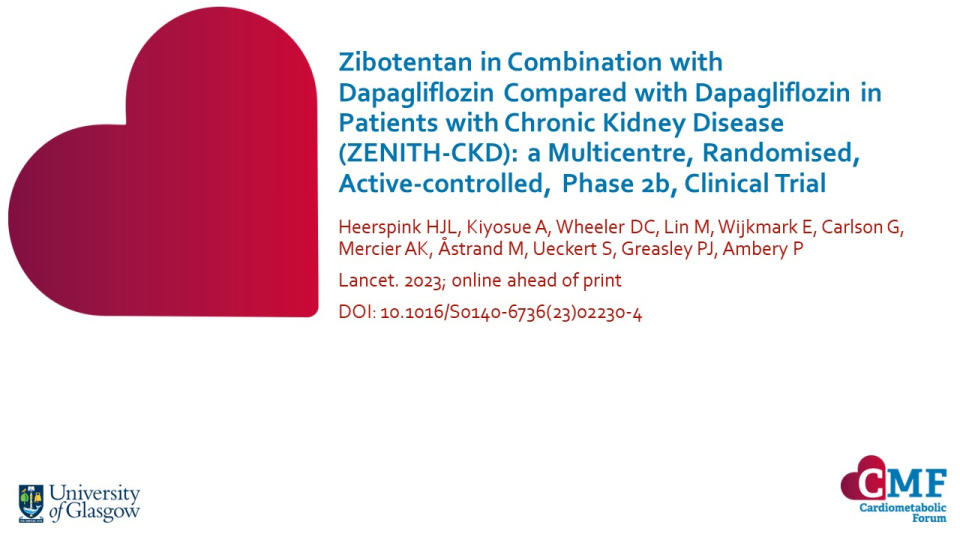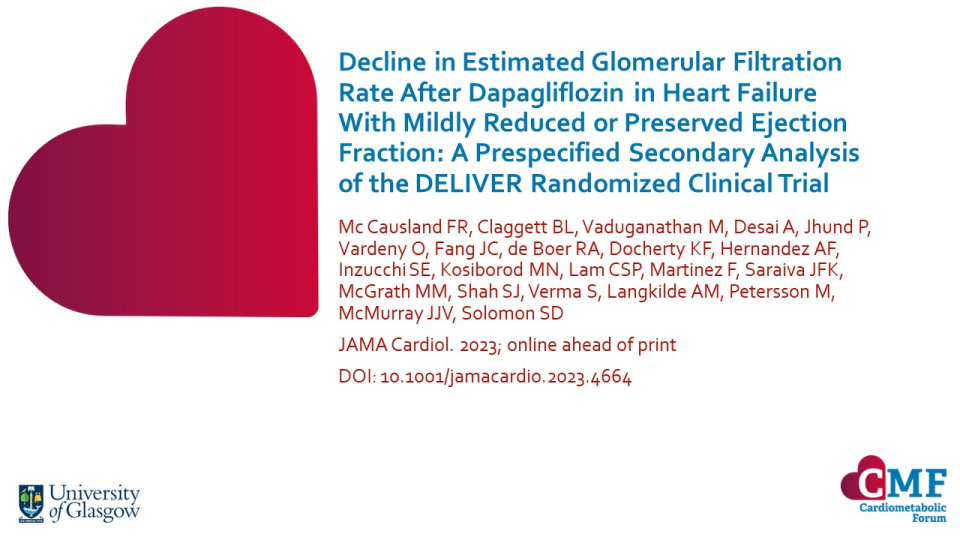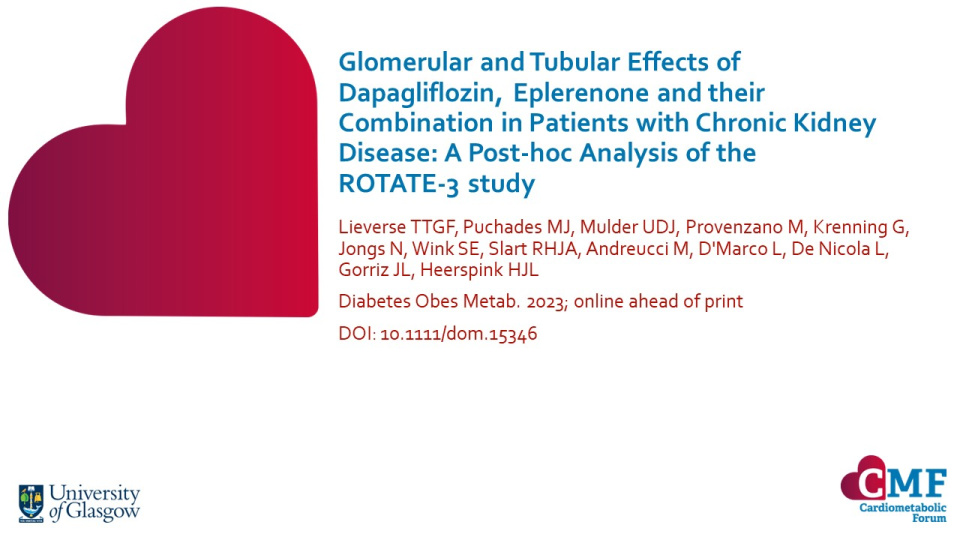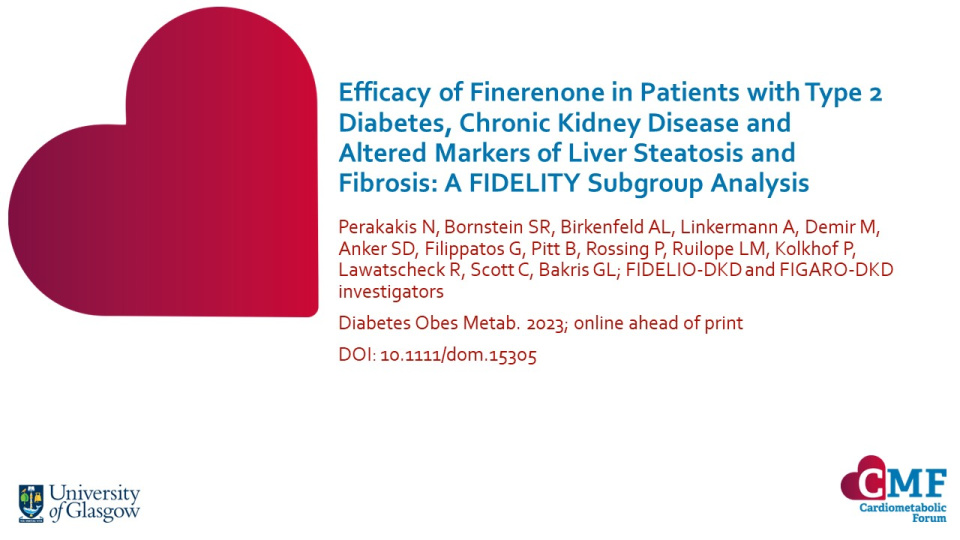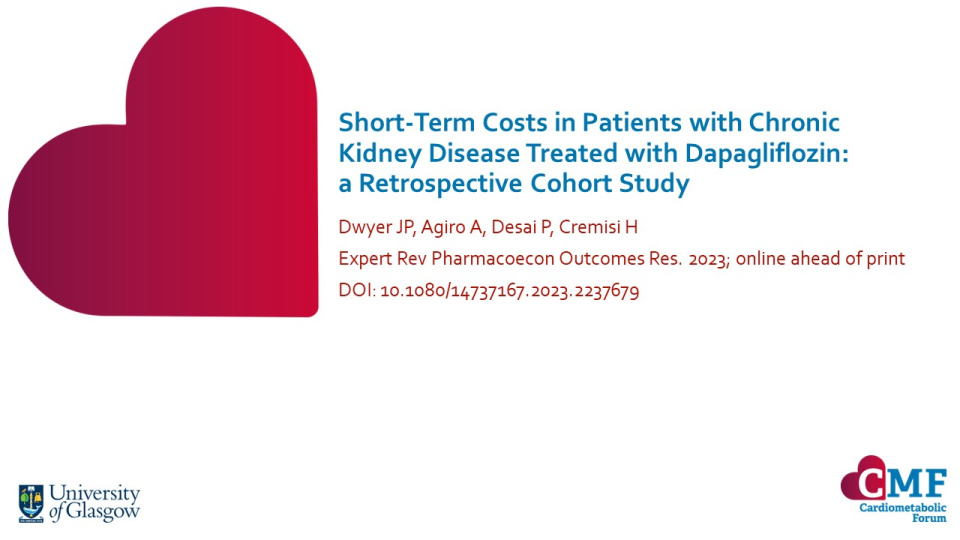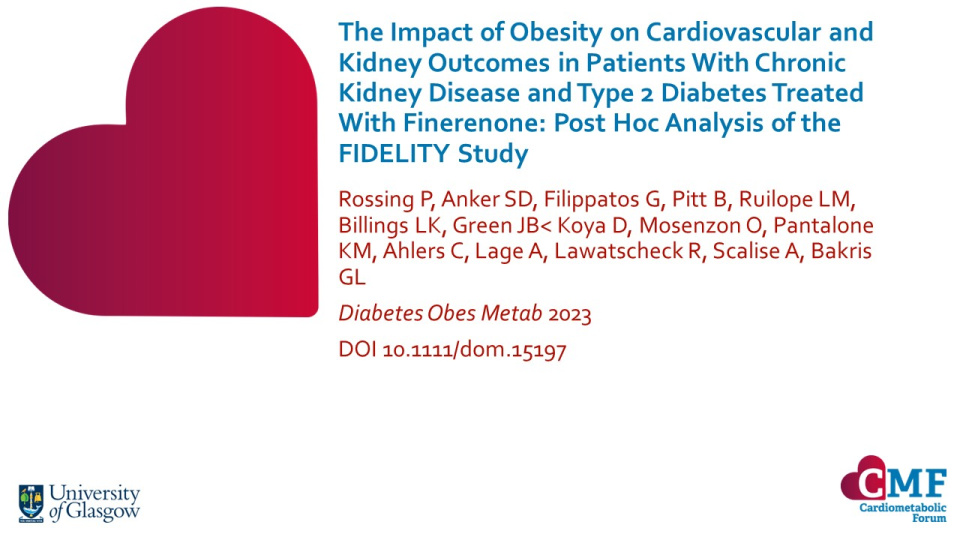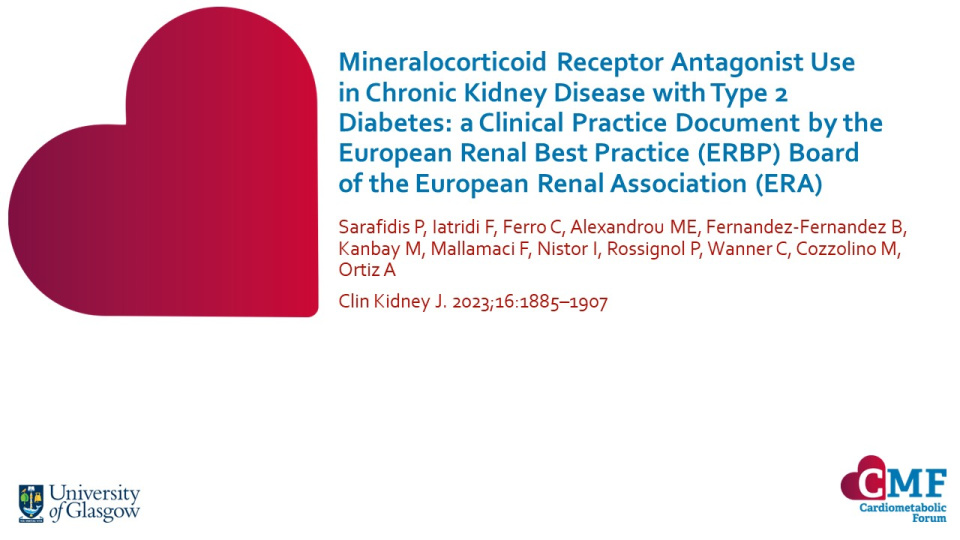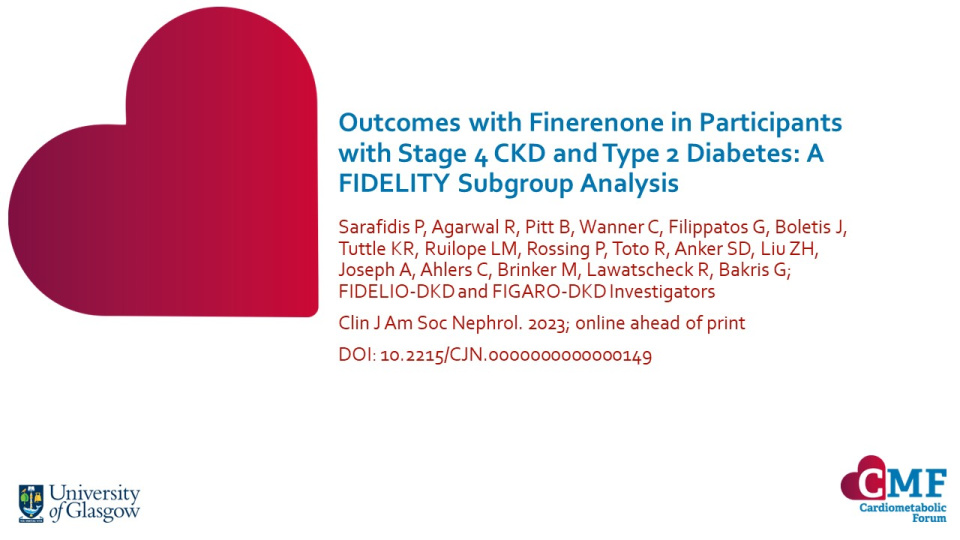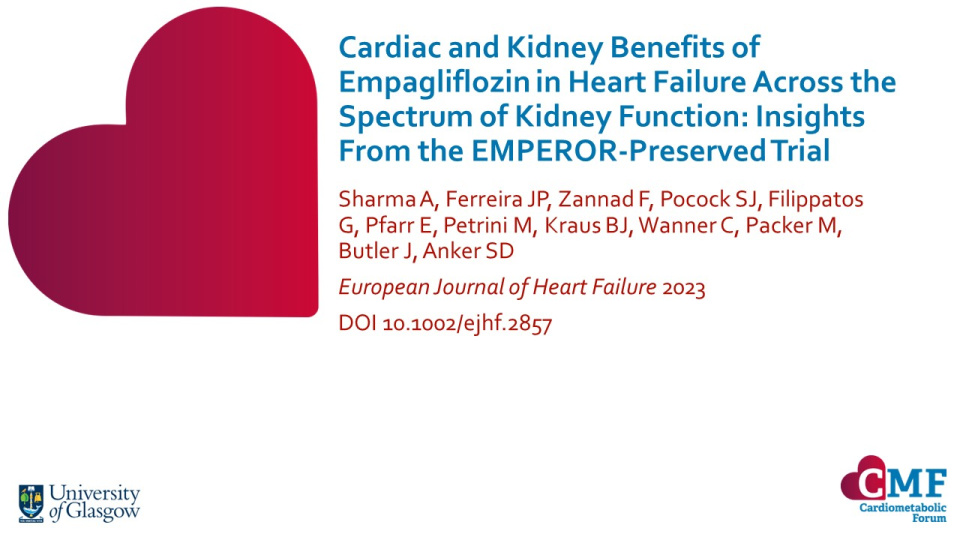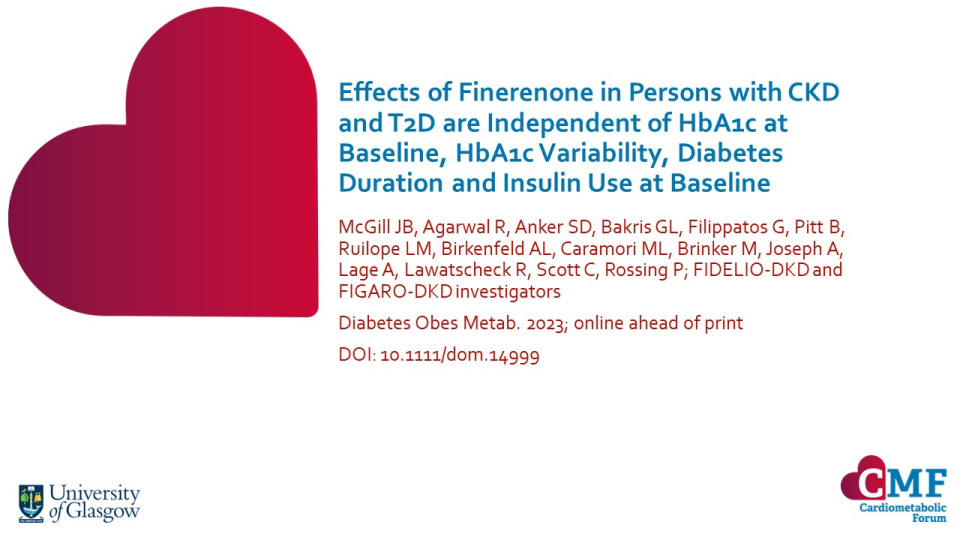Publications
Stay up to date with our literature reviews which are curated by experts to feature the most important publications released each month. Explore our publications for access to concise summary slides for your own use.
Zibotentan in Combination with Dapagliflozin Compared with Dapagliflozin in Patients with Chronic Kidney Disease (ZENITH-CKD): a Multicentre, Randomised, Active-controlled, Phase 2b, Clinical Trial
Lancet. 2023; online ahead of print DOI: 10.1016/S0140-6736(23)02230-4
The risk of kidney failure persists in many patients with CKD, even when receiving optimal treatment including SGLT2i. Increased expression of endothelin-1 may contribute to CKD progression through several pathophysiological effects; however, high doses of non-selective endothelin receptor antagonists (ERAs) have been linked with fluid retention.
Keywords:
Decline in Estimated Glomerular Filtration Rate After Dapagliflozin in Heart Failure With Mildly Reduced or Preserved Ejection Fraction: A Prespecified Secondary Analysis of the DELIVER Randomized Clinical Trial
JAMA Cardiol. 2023; online ahead of print DOI: 10.1001/jamacardio.2023.4664
An initial decline in eGFR often occurs after initiating a SGLT2i and has been observed in patients with diabetes, CKD and HF. A prespecified analysis of DELIVER evaluated the magnitude and frequency of an initial decline in eGFR (within the first month) and its association with CV and renal outcomes in 5,788 patients with HFpEF or HFmrEF.
Keywords:
Glomerular and Tubular Effects of Dapagliflozin, Eplerenone and their Combination in Patients with Chronic Kidney Disease: A Post-hoc Analysis of the ROTATE-3 Study
Diabetes Obes Metab. 2023; online ahead of print DOI: 10.1111/dom.15346
The ROTATE-3 cross-over trial in 46 adults with CKD and urinary albumin excretion ≥100 mg/24 h showed that dapagliflozin combined with eplerenone led to robust additive reductions in albuminuria compared with either agent alone. This post-hoc analysis aimed to characterise the effects of dapagliflozin, eplerenone and the combination on markers of glomerular and tubular function to better understand the mechanisms responsible for albuminuria lowering.
Keywords:
Efficacy of Finerenone in Patients with Type 2 Diabetes, Chronic Kidney Disease and Altered Markers of Liver Steatosis and Fibrosis: A FIDELITY Subgroup Analysis
Diabetes Obes Metab. 2023; online ahead of print DOI: 10.1111/dom.15305
This post hoc subgroup analysis from FIDELITY investigated the effect of finerenone on liver function, cardiovascular and kidney composite outcomes in patients with CKD and T2D, stratified by their risk of liver steatosis, inflammation and fibrosis.
Keywords:
Short-Term Costs in Patients with Chronic Kidney Disease Treated with Dapagliflozin: a Retrospective Cohort Study
Expert Rev Pharmacoecon Outcomes Res. 2023; online ahead of print DOI: 10.1080/14737167.2023.2237679
Analyses have found that dapagliflozin is cost-effective in the long term in patients with non-diabetic CKD and in patients with CKD with or without T2D. The slowing of eGFR decline and the early reduction in HF hospitalisation seen with dapagliflozin suggest that there is potential for short-term cost benefits in patients with CKD; however, there is a lack of real-world evidence. This retrospective observational cohort study described the impact of dapagliflozin on short-term medical costs in propensity matched patients with stage 3 CKD.
Keywords:
The Impact of Obesity on Cardiovascular and Kidney Outcomes in Patients with Chronic Kidney Disease and Type 2 Diabetes Treated with Finerenone: Post hoc analysis of the FIDELITY Study
Diabetes Obes Metab. 2023 doi Epub ahead of print : 10.1111/dom.15197
Patients with obesity may benefit more from treatment with mineralocorticoid receptor antagonists given their higher levels of circulating aldosterone and therefore potentially higher levels of MRs in visceral fat. The aim of this analysis was to assess the effect of finerenone on the risk of cardiovascular and kidney outcomes in patients with chronic kidney disease and type 2 diabetes, with and without obesity.
Keywords:
Mineralocorticoid Receptor Antagonist Use in Chronic Kidney Disease with Type 2 Diabetes: A Clinical Practice Document by the European Renal Best Practice (ERBP) Board of the European Renal Association (ERA)
Clin Kidney J. 2023;16:1885–1907
Patients with CKD and T2D are at high risk of both developing kidney failure and of CV events. With RAS blockers, residual risk of CKD progression remains high and no significant reduction in CV events and mortality has been seen in major studies in patients with CKD and T2D. Steroidal MRAs have been shown to reduce albuminuria in individuals on RAS monotherapy, but widespread clinical use is limited by the risk of hyperkalaemia and the absence of trials with hard renal outcomes. In recent years, non-steroidal MRAs have received increasing interest due to their better pharmacological profile, particularly finerenone, which effectively reduced CKD progression and CV outcomes in participants with T2D in Phase 3 trials.
Keywords:
Outcomes with Finerenone in Participants with Stage 4 CKD and Type 2 Diabetes: A FIDELITY Subgroup Analysis
Clin J Am Soc Nephrol. 2023; online ahead of print DOI: 10.2215/CJN.0000000000000149
Patients with stage 4 CKD and T2D have limited treatment options to reduce their persistent CV and kidney risk. This post hoc analysis of the FIDELITY database evaluated the effect of finerenone vs placebo in 890 patients with stage 4 CKD and T2D.
Keywords:
Cardiac and Kidney Benefits of Empagliflozin in Heart Failure Across the Spectrum of Kidney Function: Insights From the EMPEROR-Preserved Trial
European Journal of Heart Failure 2023 DOI 10.1002/ejhf.2857
In the EMPEROR-Preserved trial, empagliflozin was found to improve the clinical outcomes of patients with heart failure and preserved ejection fraction (HFpEF). This pre-specified analysis sought to explore the effect of empagliflozin on cardiovascular (CV) and kidney outcomes across different levels of kidney function.
Effects of Finerenone in Persons with CKD and T2D are Independent of HbA1c at Baseline, HbA1c Variability, Diabetes Duration and Insulin Use at Baseline
Diabetes Obes Metab. 2023; online ahead of print DOI: 10.1111/dom.14999
Given the role of HbA1c, diabetes duration and insulin use in determining morbidity and mortality of CKD in T2D, it is important to investigate whether these factors modify the efficacy and safety of therapies that mitigate the cardiorenal impact of CKD in T2D. This post hoc analysis of the FIDELITY database evaluated the effect of finerenone by baseline HbA1c, HbA1c variability, diabetes duration and baseline insulin use on cardiorenal outcomes and diabetes progression.

